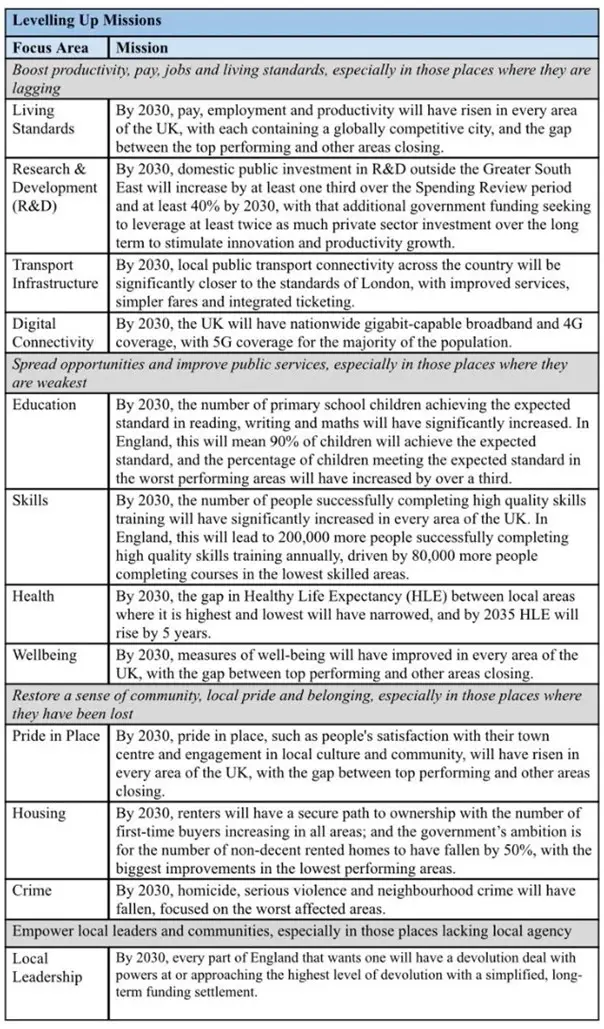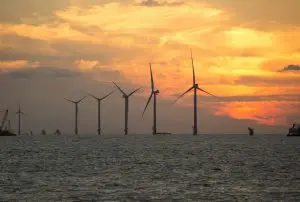Last week, the Government published its long-awaited Levelling Up White Paper. The White Paper goes some way to answering the vexed question of ‘What is levelling up?’, by setting out twelve missions the Government hopes to accomplish by 2030.[1] In addition, the Paper sets out a framework for extending devolution in England which could increase the transparency of the process.[2] However, new funding commitments are thin on the ground, and critics suggest the Government has not provided enough money for Levelling Up to succeed.[3]
Twelve missions show that Levelling Up is a medium-term project
The Government has set out its vision of what ‘levelling up’ means, by setting out twelve ‘missions’ aiming to reduce regional disparities and improve economic performance and quality of life across the country by 2030.[4]
While the wording of the missions adds some shape to the nebulous term ‘levelling-up’, they are phrased so as to command broad support. General aims include reducing disparities in economic performance, crime and education.
These missions show that the Government views Levelling Up as a medium-term project. Each objective has an end date of 2030, which will be welcomed by some stakeholders who value the consistency that brings. However, the eight-year project means voters will not be able to judge the success of government intervention at the next election.
Local Government changes aim to streamline a confusing process
Chapter 2 of the White Paper sets out plans for further devolution in England. It proposes not only an extension of devolution, but a new overarching framework, with the aim of making the system more consistent and clear.[5]
The Government’s preferred model involves a directly-elected leader covering ‘a well defined economic geography with a clear and direct mandate, strong accountability and the convening power to make change happen’[6], but will offer a tiered approach in areas where this model is inappropriate.
The framework will work towards the goal of every area of England that wants a devolution deal having one by 2030.[7] Ambitions for further devolution have been welcomed by several key stakeholders, including the Local Government Association[8], although some commenters have criticised the Government for not going further.[9]
It remains to be seen how further devolution will go down with voters. If the devolution deals are backed up with more cash for local services, that will likely prove popular, but innovations like county governors and even more metro mayors may add even more confusion to England’s already complicated local government landscape.
White Paper brings little new funding
Departmental allocations for the next three years were made in the 2021 Spending Review, and the Chancellor did not commit any further funding to back up the White Paper.[10] Stakeholders will therefore find the funding commitments to be familiar ground, with most of the big funds and schemes having already been announced.
The White Paper does reiterate a host of funding schemes that fall under the Levelling Up umbrella., including the Levelling Up Fund, Regional Investment Funds, and the Towns Fund.
Critics have accused the Government of not going far enough to fund the Levelling Up missions.[11] In addition, some have expressed concern that the distribution of funding may be directed more by short-term political objectives than long-term strategy.
BREVIA CONSULTING PROVIDES STRAIGHTFORWARD POLITICAL ADVICE AND SUPPORT TO BUSINESSES AND ORGANISATIONS
Discover how Brevia can help you and your organisation by contacting the Brevia Team on 020 7091 1650 or contact@brevia.co.uk
Notes
[1] DLUHC, Levelling Up the United Kingdom, 2 February 2022, p.120, link
[2] DLUHC, Levelling Up the United Kingdom, 2 February 2022, p.333, link
[3] The Guardian, What does the levelling up white paper say?, 2 February 2022, link
[4] DLUHC, Levelling Up the United Kingdom, 2 February 2022, p.120, link
[5] DLUHC, Levelling Up the United Kingdom, 2 February 2022, p.136, link
[6] Ibid
[7] DLUHC, Levelling Up the United Kingdom, 2 February 2022, p.234, link
[8] Local Government Association, LGA Statement: Levelling Up White Paper, 2 February 2022, link
[9] The Economist, The British government’s white paper on “levelling up” falls short, 5 February 2022, link
[10] The Guardian, What does the levelling up white paper say?, 2 February 2022, link
[11] The Economist, The British government’s white paper on “levelling up” falls short, 5 February 2022, link





